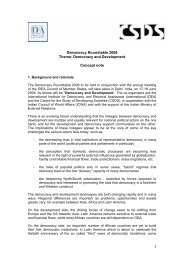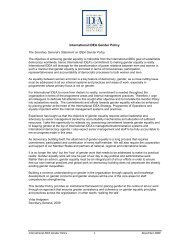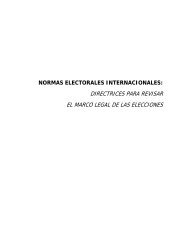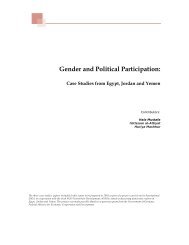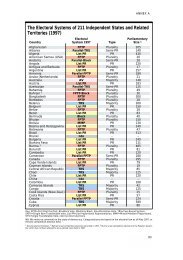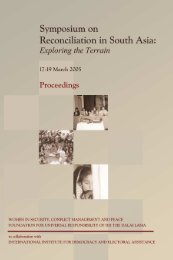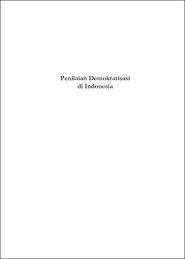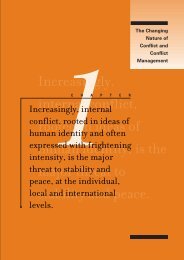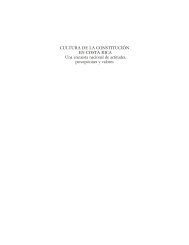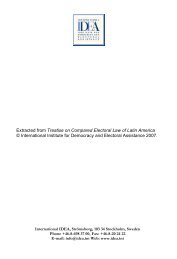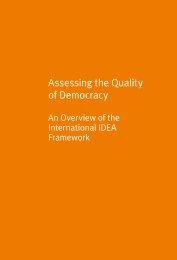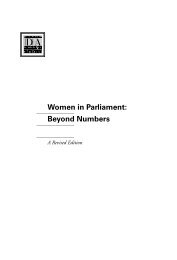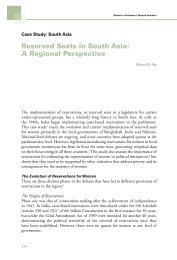The Role of State Constitutions in Protecting ... - International IDEA
The Role of State Constitutions in Protecting ... - International IDEA
The Role of State Constitutions in Protecting ... - International IDEA
Create successful ePaper yourself
Turn your PDF publications into a flip-book with our unique Google optimized e-Paper software.
<strong>The</strong> mere description <strong>of</strong> the Australian model for divid<strong>in</strong>g federal power makes it<br />
sound as if it favors the <strong>State</strong>s, as <strong>in</strong>deed it was expected to do. In practice,<br />
however, power has gradually shifted to the Commonwealth, largely through<br />
judicial <strong>in</strong>terpretation, but <strong>in</strong> a manner that seems to have reflected the chang<strong>in</strong>g<br />
needs and circumstances <strong>of</strong> the Australian people. Australia is not unique <strong>in</strong> this<br />
regard; a similar pattern <strong>of</strong> growth <strong>of</strong> central power can be seen <strong>in</strong>, for example,<br />
the United <strong>State</strong>s (US), which divides federal power <strong>in</strong> the same way. <strong>The</strong> US and<br />
Australian experience suggests that, if particular powers need to be guaranteed to<br />
the <strong>State</strong>s <strong>in</strong> a federation <strong>in</strong> Burma, the Constitution should expressly say so by,<br />
for example, provid<strong>in</strong>g a list <strong>of</strong> exclusive <strong>State</strong> powers.<br />
It might be helpful to give an example <strong>of</strong> how the division <strong>of</strong> powers works <strong>in</strong> the<br />
Australian federation. One <strong>of</strong> the legislative powers given to the Commonwealth<br />
by the Constitution is a power to make laws with respect to “external affairs”. <strong>The</strong><br />
High Court has held that this enables the Commonwealth Parliament to<br />
<strong>in</strong>corporate <strong>in</strong>to Australian law any <strong>in</strong>ternational treaty to which Australia is a<br />
party. Some <strong>of</strong> these treaties deal with matters otherwise with<strong>in</strong> <strong>State</strong> power; the<br />
environment is an example. By rely<strong>in</strong>g on the external affairs power, the<br />
Commonwealth Parliament therefore can make laws on matters that the <strong>State</strong>s<br />
had previously thought were their responsibility. Moreover, the decision to sign<br />
and ratify a treaty is an executive decision, which falls with<strong>in</strong> Commonwealth<br />
executive power. Any legal dispute aris<strong>in</strong>g under a Commonwealth law <strong>in</strong>corporat<strong>in</strong>g<br />
a treaty <strong>in</strong>volves federal judicial power and will be dealt with <strong>in</strong><br />
Commonwealth courts unless the Commonwealth Parliament has given<br />
jurisdiction to the <strong>State</strong> courts.<br />
<strong>The</strong> particular powers given to the Commonwealth<br />
<strong>The</strong> Australian Constitution gives 40 legislative powers to the Commonwealth<br />
Parliament.<br />
With<strong>in</strong> this list, it is possible to identify particular categories <strong>of</strong> powers, as follows:<br />
◆<br />
◆<br />
◆<br />
External affairs and associated matters (for example, relations with the<br />
islands <strong>of</strong> the Pacific; quarant<strong>in</strong>e; the <strong>in</strong>flux <strong>of</strong> crim<strong>in</strong>als)<br />
Defense, <strong>in</strong>clud<strong>in</strong>g ma<strong>in</strong>tenance <strong>of</strong> the defense forces, which effectively<br />
is an exclusive Commonwealth power, under section 114. <strong>The</strong><br />
Commonwealth has an obligation to defend the <strong>State</strong>s, under section<br />
119. By contrast, the general police force is a <strong>State</strong> responsibility; while<br />
there is a federal police force, it deals only with crim<strong>in</strong>al matters aris<strong>in</strong>g<br />
under Commonwealth law (for example, <strong>of</strong>fences deal<strong>in</strong>g with the<br />
importation <strong>of</strong> drugs).<br />
Commercial matters: <strong>in</strong>terstate and overseas trade; bank<strong>in</strong>g; <strong>in</strong>surance;<br />
weights and measures; currency and co<strong>in</strong>age (effectively also exclusive,<br />
under section 114); foreign, trad<strong>in</strong>g and f<strong>in</strong>ancial corporations.<br />
36



